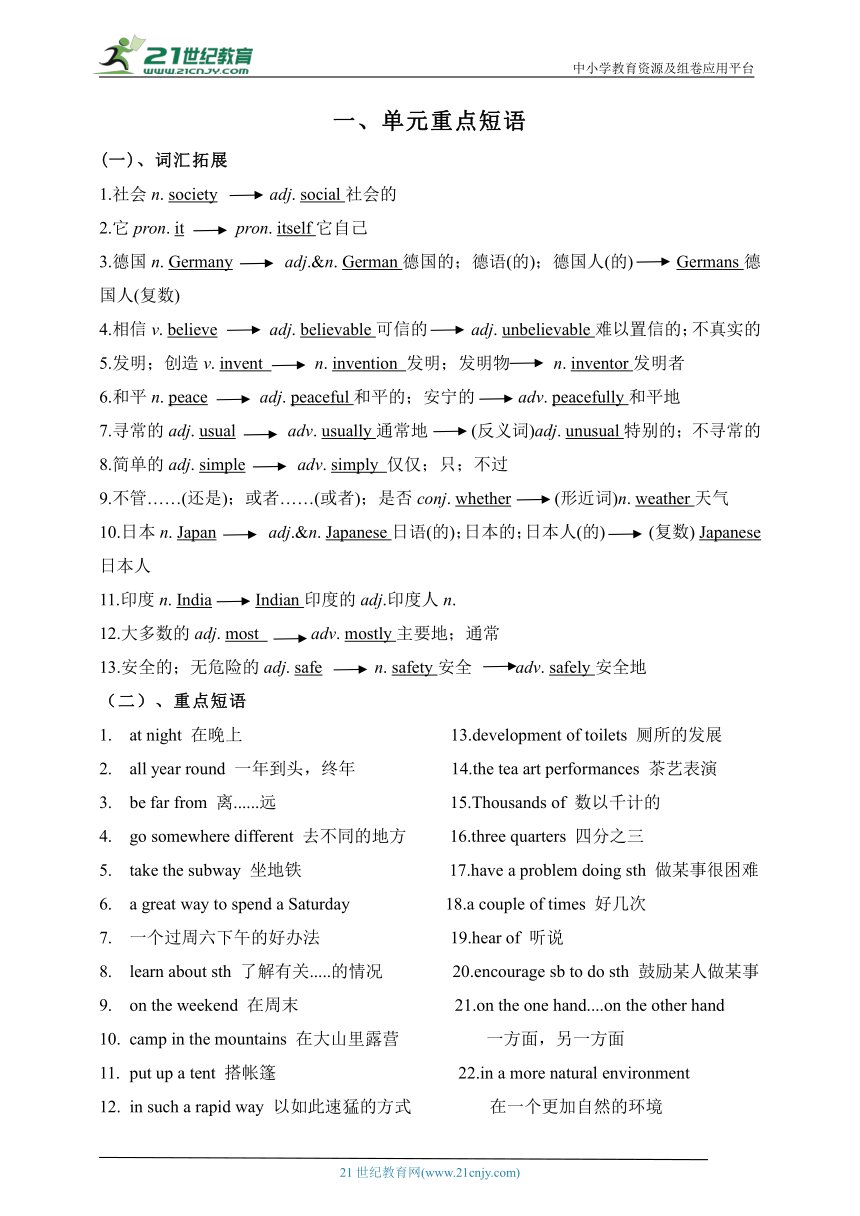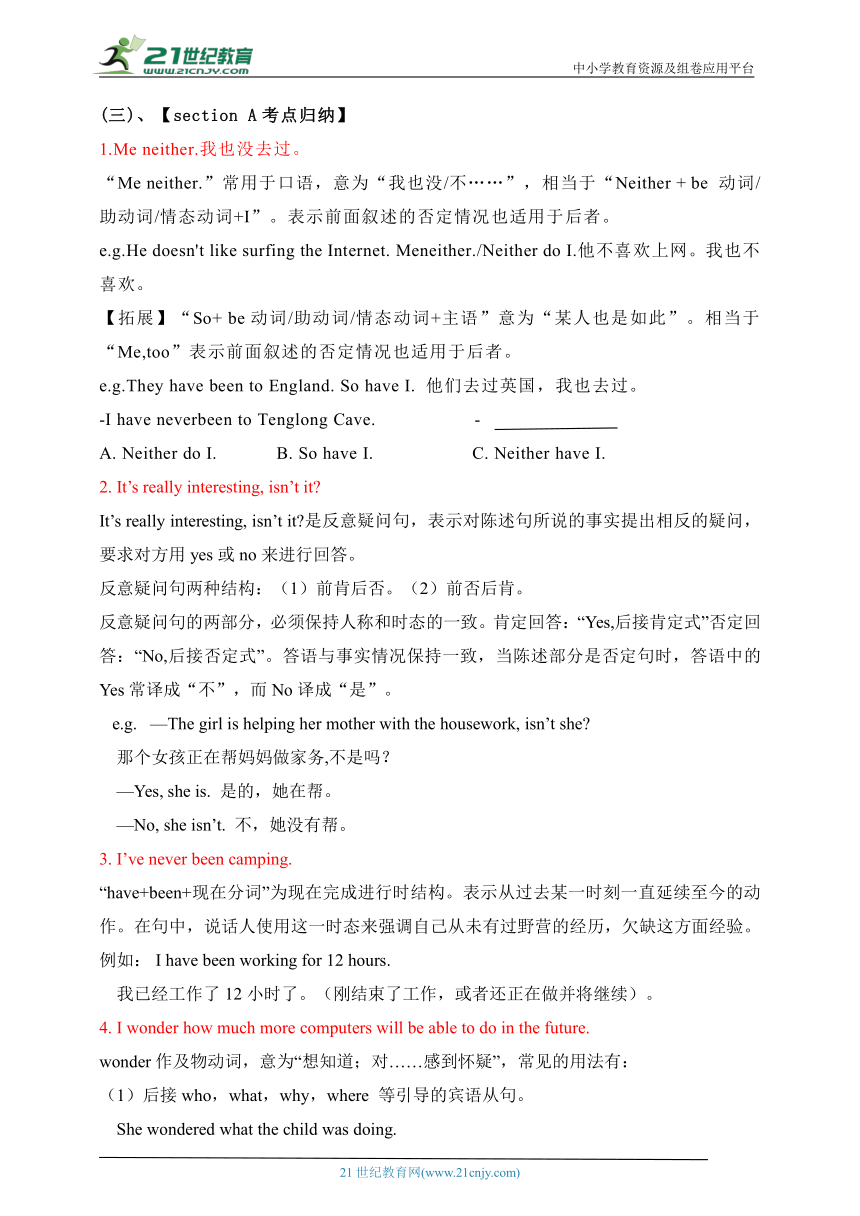Unit 9 Have you ever been to a museum 单元知识点归纳学案
文档属性
| 名称 | Unit 9 Have you ever been to a museum 单元知识点归纳学案 |  | |
| 格式 | doc | ||
| 文件大小 | 1.2MB | ||
| 资源类型 | 试卷 | ||
| 版本资源 | 人教新目标(Go for it)版 | ||
| 科目 | 英语 | ||
| 更新时间 | 2023-05-19 13:25:29 | ||
图片预览


文档简介
中小学教育资源及组卷应用平台
一、单元重点短语
(一)、词汇拓展
1.社会n. society adj. social社会的
2.它pron. it pron. itself它自己
3.德国n. Germany adj.&n. German德国的;德语(的);德国人(的) Germans德国人(复数)
4.相信v. believe adj. believable可信的 adj. unbelievable难以置信的;不真实的
5.发明;创造v. invent n. invention 发明;发明物 n. inventor发明者
6.和平n. peace adj. peaceful和平的;安宁的 adv. peacefully和平地
7.寻常的adj. usual adv. usually通常地 (反义词)adj. unusual特别的;不寻常的
8.简单的adj. simple adv. simply 仅仅;只;不过
9.不管……(还是);或者……(或者);是否conj. whether (形近词)n. weather天气
10.日本n. Japan adj.&n. Japanese日语(的);日本的;日本人(的) (复数) Japanese日本人
11.印度n. India Indian印度的adj.印度人n.
12.大多数的adj. most adv. mostly主要地;通常
13.安全的;无危险的adj. safe n. safety安全 adv. safely安全地
(二)、重点短语
1. at night 在晚上 13.development of toilets 厕所的发展
2. all year round 一年到头,终年 14.the tea art performances 茶艺表演
3. be far from 离......远 15.Thousands of 数以千计的
4. go somewhere different 去不同的地方 16.three quarters 四分之三
5. take the subway 坐地铁 17.have a problem doing sth 做某事很困难
6. a great way to spend a Saturday 18.a couple of times 好几次
7. 一个过周六下午的好办法 19.hear of 听说
8. learn about sth 了解有关.....的情况 20.encourage sb to do sth 鼓励某人做某事
9. on the weekend 在周末 21.on the one hand....on the other hand
10. camp in the mountains 在大山里露营 一方面,另一方面
11. put up a tent 搭帐篷 22.in a more natural environment
12. in such a rapid way 以如此速猛的方式 在一个更加自然的环境
(三)、【section A考点归纳】
1.Me neither.我也没去过。
“Me neither.”常用于口语,意为“我也没/不……”,相当于“Neither + be 动词/助动词/情态动词+I”。表示前面叙述的否定情况也适用于后者。
e.g.He doesn't like surfing the Internet. Meneither./Neither do I.他不喜欢上网。我也不喜欢。
【拓展】“So+ be动词/助动词/情态动词+主语”意为“某人也是如此”。相当于“Me,too”表示前面叙述的否定情况也适用于后者。
e.g.They have been to England. So have I. 他们去过英国,我也去过。
-I have neverbeen to Tenglong Cave. -
A. Neither do I. B. So have I. C. Neither have I.
2. It’s really interesting, isn’t it
It’s really interesting, isn’t it 是反意疑问句,表示对陈述句所说的事实提出相反的疑问,要求对方用yes或no来进行回答。
反意疑问句两种结构:(1)前肯后否。(2)前否后肯。
反意疑问句的两部分,必须保持人称和时态的一致。肯定回答:“Yes,后接肯定式”否定回答:“No,后接否定式”。答语与事实情况保持一致,当陈述部分是否定句时,答语中的Yes常译成“不”,而No译成“是”。
e.g. —The girl is helping her mother with the housework, isn’t she
那个女孩正在帮妈妈做家务,不是吗?
—Yes, she is. 是的,她在帮。
—No, she isn’t. 不,她没有帮。
3. I’ve never been camping.
“have+been+现在分词”为现在完成进行时结构。表示从过去某一时刻一直延续至今的动作。在句中,说话人使用这一时态来强调自己从未有过野营的经历,欠缺这方面经验。例如: I have been working for 12 hours.
我已经工作了12小时了。(刚结束了工作,或者还正在做并将继续)。
4. I wonder how much more computers will be able to do in the future.
wonder作及物动词,意为“想知道;对……感到怀疑”,常见的用法有:
(1)后接who,what,why,where 等引导的宾语从句。
She wondered what the child was doing.
她感到疑惑,孩子究竟在干什么。
I wonder where they have gone.
我想知道他们去哪儿了。
(2)后接 that 引导的宾语从句,表示“对……感到惊讶”, that常可省去。
I wonder (that) she has won the race.
我对她赢了比赛感到惊讶。
(3)后接 if 或 whether 引导的宾语从句,常用来表示一种委婉的请求或疑问。
She wondered whether you were free that morning.
她想知道你那天上午是否有空。
I wonder if he will succeed.
我不知道他会不会成功。
5. The tea art performances show how to make a perfect cup of tea with beautiful tea sets.
how to make a perfect cup of tea是“特殊疑问词+动词不定式”,在句子中作动词show的宾语。相当于特殊疑问词引导的宾语从句。例如:
I don’t know what to do =I don’t know what I can do next.
我不知道下一步做什么。
(四)、【section B考点归纳】
1.On the one hand, more than three quarters of the population Chinese...一方面,超过四分之三的人口是华裔。
three quarters意为“四分之三”。在表达英语的分数时,要注意分子用基数词,分母用序数词,当分子大于1的时候,分母要用序数词的复数形式。如:a quarter 四分之一;a/onesixth 六分之一; five sevenths 七分之。
【拓展】由“分数(或百分数)+of+名词”构成的名词词组作主语时,其后的动词形式依of词组中的名词而定。
e.g.Two thirds of the water has been used forfarming.三分之二的水已经被用于灌溉农田了。
2. Whether you like Indianfood, Western food or Japanese food, you'llfind it all in Singapore!不管你喜欢印度食物、西方食物还是日本食物,你都能在新加坡找到它!
whether 为连词,意为“不管……(还是);或者…(或者)”,常与or(not)连用,引导让步状语从句,从句中通常用一般现在时表示将来。
Whether you like it or not, you'll have todo it.不管你喜不喜欢,你必须做这件事。
【拓展】whether还可意为“是否”,引导宾语从句,相当于if。两者一般可以互换。
I don't know if/whether he will come. 我不知道他是否会来。
注意引导宾语从句时,在不定式前、介词后用 whether,而不用 if。
We haven't decided whether to go there.们还没决定是否要去那里。
It depends on whether the letter arrives intime. 这取决于信是否来得及时。
3.So you can choose to go wheneveryou like-spring,,summer,autumnorwinter.因此,你可以选择在你喜欢的任何季节去——春天、夏天、秋天或者冬天。
whenever引导让步状语从句,意为“无论何时”。
e.g.I told him to come back whenever he wantsto.我告诉他什么时候想回来就回来。
【拓展】“疑问词-ever"=“no matter+疑问词”,意为“无论…都……;不管……都…”。
No matter what (=Whatever) happened,he would not mind.无论发生了什么事情,他都不会介意的。
No matter who (=Whoever) you are, youmust keep the law.不管你是谁,你都需要遵纪守法。
辨析:one,it与that
one 泛指前面提到的同类人或物中的一个,即同类不同物 复数形式为ones.
It 特指前面提到的同一事物,即同类同物。 复数形式为they或them.
that 表特指,与所指名词同类,但不是同一个;可代替上文提到的事情。 复数形式为those.
21世纪教育网 www.21cnjy.com 精品试卷·第 2 页 (共 2 页)
HYPERLINK "http://21世纪教育网(www.21cnjy.com)
" 21世纪教育网(www.21cnjy.com)
一、单元重点短语
(一)、词汇拓展
1.社会n. society adj. social社会的
2.它pron. it pron. itself它自己
3.德国n. Germany adj.&n. German德国的;德语(的);德国人(的) Germans德国人(复数)
4.相信v. believe adj. believable可信的 adj. unbelievable难以置信的;不真实的
5.发明;创造v. invent n. invention 发明;发明物 n. inventor发明者
6.和平n. peace adj. peaceful和平的;安宁的 adv. peacefully和平地
7.寻常的adj. usual adv. usually通常地 (反义词)adj. unusual特别的;不寻常的
8.简单的adj. simple adv. simply 仅仅;只;不过
9.不管……(还是);或者……(或者);是否conj. whether (形近词)n. weather天气
10.日本n. Japan adj.&n. Japanese日语(的);日本的;日本人(的) (复数) Japanese日本人
11.印度n. India Indian印度的adj.印度人n.
12.大多数的adj. most adv. mostly主要地;通常
13.安全的;无危险的adj. safe n. safety安全 adv. safely安全地
(二)、重点短语
1. at night 在晚上 13.development of toilets 厕所的发展
2. all year round 一年到头,终年 14.the tea art performances 茶艺表演
3. be far from 离......远 15.Thousands of 数以千计的
4. go somewhere different 去不同的地方 16.three quarters 四分之三
5. take the subway 坐地铁 17.have a problem doing sth 做某事很困难
6. a great way to spend a Saturday 18.a couple of times 好几次
7. 一个过周六下午的好办法 19.hear of 听说
8. learn about sth 了解有关.....的情况 20.encourage sb to do sth 鼓励某人做某事
9. on the weekend 在周末 21.on the one hand....on the other hand
10. camp in the mountains 在大山里露营 一方面,另一方面
11. put up a tent 搭帐篷 22.in a more natural environment
12. in such a rapid way 以如此速猛的方式 在一个更加自然的环境
(三)、【section A考点归纳】
1.Me neither.我也没去过。
“Me neither.”常用于口语,意为“我也没/不……”,相当于“Neither + be 动词/助动词/情态动词+I”。表示前面叙述的否定情况也适用于后者。
e.g.He doesn't like surfing the Internet. Meneither./Neither do I.他不喜欢上网。我也不喜欢。
【拓展】“So+ be动词/助动词/情态动词+主语”意为“某人也是如此”。相当于“Me,too”表示前面叙述的否定情况也适用于后者。
e.g.They have been to England. So have I. 他们去过英国,我也去过。
-I have neverbeen to Tenglong Cave. -
A. Neither do I. B. So have I. C. Neither have I.
2. It’s really interesting, isn’t it
It’s really interesting, isn’t it 是反意疑问句,表示对陈述句所说的事实提出相反的疑问,要求对方用yes或no来进行回答。
反意疑问句两种结构:(1)前肯后否。(2)前否后肯。
反意疑问句的两部分,必须保持人称和时态的一致。肯定回答:“Yes,后接肯定式”否定回答:“No,后接否定式”。答语与事实情况保持一致,当陈述部分是否定句时,答语中的Yes常译成“不”,而No译成“是”。
e.g. —The girl is helping her mother with the housework, isn’t she
那个女孩正在帮妈妈做家务,不是吗?
—Yes, she is. 是的,她在帮。
—No, she isn’t. 不,她没有帮。
3. I’ve never been camping.
“have+been+现在分词”为现在完成进行时结构。表示从过去某一时刻一直延续至今的动作。在句中,说话人使用这一时态来强调自己从未有过野营的经历,欠缺这方面经验。例如: I have been working for 12 hours.
我已经工作了12小时了。(刚结束了工作,或者还正在做并将继续)。
4. I wonder how much more computers will be able to do in the future.
wonder作及物动词,意为“想知道;对……感到怀疑”,常见的用法有:
(1)后接who,what,why,where 等引导的宾语从句。
She wondered what the child was doing.
她感到疑惑,孩子究竟在干什么。
I wonder where they have gone.
我想知道他们去哪儿了。
(2)后接 that 引导的宾语从句,表示“对……感到惊讶”, that常可省去。
I wonder (that) she has won the race.
我对她赢了比赛感到惊讶。
(3)后接 if 或 whether 引导的宾语从句,常用来表示一种委婉的请求或疑问。
She wondered whether you were free that morning.
她想知道你那天上午是否有空。
I wonder if he will succeed.
我不知道他会不会成功。
5. The tea art performances show how to make a perfect cup of tea with beautiful tea sets.
how to make a perfect cup of tea是“特殊疑问词+动词不定式”,在句子中作动词show的宾语。相当于特殊疑问词引导的宾语从句。例如:
I don’t know what to do =I don’t know what I can do next.
我不知道下一步做什么。
(四)、【section B考点归纳】
1.On the one hand, more than three quarters of the population Chinese...一方面,超过四分之三的人口是华裔。
three quarters意为“四分之三”。在表达英语的分数时,要注意分子用基数词,分母用序数词,当分子大于1的时候,分母要用序数词的复数形式。如:a quarter 四分之一;a/onesixth 六分之一; five sevenths 七分之。
【拓展】由“分数(或百分数)+of+名词”构成的名词词组作主语时,其后的动词形式依of词组中的名词而定。
e.g.Two thirds of the water has been used forfarming.三分之二的水已经被用于灌溉农田了。
2. Whether you like Indianfood, Western food or Japanese food, you'llfind it all in Singapore!不管你喜欢印度食物、西方食物还是日本食物,你都能在新加坡找到它!
whether 为连词,意为“不管……(还是);或者…(或者)”,常与or(not)连用,引导让步状语从句,从句中通常用一般现在时表示将来。
Whether you like it or not, you'll have todo it.不管你喜不喜欢,你必须做这件事。
【拓展】whether还可意为“是否”,引导宾语从句,相当于if。两者一般可以互换。
I don't know if/whether he will come. 我不知道他是否会来。
注意引导宾语从句时,在不定式前、介词后用 whether,而不用 if。
We haven't decided whether to go there.们还没决定是否要去那里。
It depends on whether the letter arrives intime. 这取决于信是否来得及时。
3.So you can choose to go wheneveryou like-spring,,summer,autumnorwinter.因此,你可以选择在你喜欢的任何季节去——春天、夏天、秋天或者冬天。
whenever引导让步状语从句,意为“无论何时”。
e.g.I told him to come back whenever he wantsto.我告诉他什么时候想回来就回来。
【拓展】“疑问词-ever"=“no matter+疑问词”,意为“无论…都……;不管……都…”。
No matter what (=Whatever) happened,he would not mind.无论发生了什么事情,他都不会介意的。
No matter who (=Whoever) you are, youmust keep the law.不管你是谁,你都需要遵纪守法。
辨析:one,it与that
one 泛指前面提到的同类人或物中的一个,即同类不同物 复数形式为ones.
It 特指前面提到的同一事物,即同类同物。 复数形式为they或them.
that 表特指,与所指名词同类,但不是同一个;可代替上文提到的事情。 复数形式为those.
21世纪教育网 www.21cnjy.com 精品试卷·第 2 页 (共 2 页)
HYPERLINK "http://21世纪教育网(www.21cnjy.com)
" 21世纪教育网(www.21cnjy.com)
同课章节目录
- Unit 1 What's the matter?
- Section A
- Section B
- Unit 2 I'll help to clean up the city parks.
- Section A
- Section B
- Unit 3 Could you please clean your room?
- Section A
- Section B
- Unit 4 Why don't you talk to your parents?
- Section A
- Section B
- Unit 5 What were you doing when the rainstorm came
- Section A
- Section B
- Review of Units 1-5
- Unit 6 An old man tried to move the mountains.
- Section A
- Section B
- Unit 7 What's the highest mountain in the world?
- Section A
- Section B
- Unit 8 Have you read Treasure Island yet?
- Section A
- Section B
- Unit 9 Have you ever been to a museum?
- Section A
- Section B
- Unit 10 I've had this bike for three years.
- Section A
- Section B
